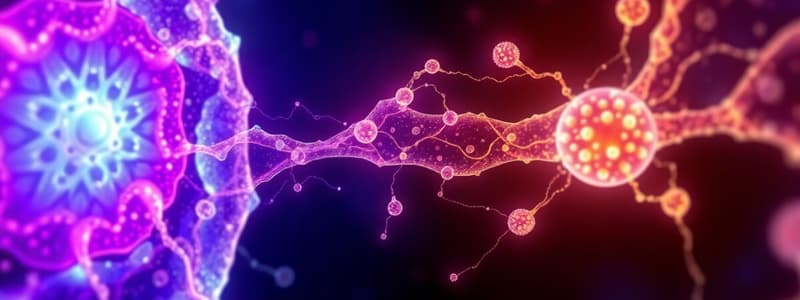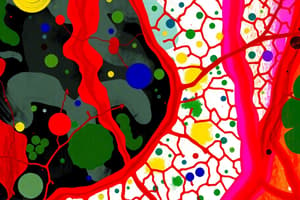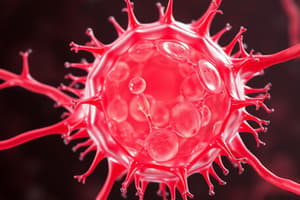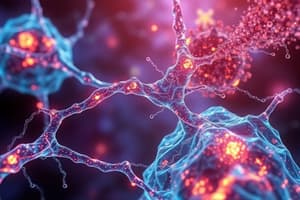Podcast
Questions and Answers
What is the primary function of cell adhesion in multicellular organisms?
What is the primary function of cell adhesion in multicellular organisms?
- Waste elimination
- Nutrient absorption
- Tissue formation (correct)
- Metabolic processes
Leukocytes binding to endothelial cells is an example of firm adhesion.
Leukocytes binding to endothelial cells is an example of firm adhesion.
False (B)
Name one function of tight junctions.
Name one function of tight junctions.
Conferring impermeability
____________ are cell adhesion molecules that link to the actin cytoskeleton in adherens junctions.
____________ are cell adhesion molecules that link to the actin cytoskeleton in adherens junctions.
Match the cell adhesion molecule with its function:
Match the cell adhesion molecule with its function:
Which type of junction allows passage of small molecules and ions between cells?
Which type of junction allows passage of small molecules and ions between cells?
Cell adhesion molecules play no role in signaling between cells.
Cell adhesion molecules play no role in signaling between cells.
What is the role of integrins in cell adhesion?
What is the role of integrins in cell adhesion?
Transient cellular adhesions include the attachment of ________ to endothelial cells.
Transient cellular adhesions include the attachment of ________ to endothelial cells.
Which of the following types of junctions provides structural support while allowing signal transduction?
Which of the following types of junctions provides structural support while allowing signal transduction?
What is the primary role of selectins in response to inflammation?
What is the primary role of selectins in response to inflammation?
E-selectin is downregulated during inflammatory responses.
E-selectin is downregulated during inflammatory responses.
What are hemidesmosomes primarily responsible for?
What are hemidesmosomes primarily responsible for?
Selectins promote _____ aggregation.
Selectins promote _____ aggregation.
Which integrin is specialized in linking epithelial cells to the basement membrane?
Which integrin is specialized in linking epithelial cells to the basement membrane?
Syndecans are responsible for mediating cell adhesion to extracellular matrix.
Syndecans are responsible for mediating cell adhesion to extracellular matrix.
Name one type of cell that expresses syndecans.
Name one type of cell that expresses syndecans.
Integrins are composed of non-covalently bound _____ molecules.
Integrins are composed of non-covalently bound _____ molecules.
Match the following terms with their functions:
Match the following terms with their functions:
What are the signalling roles of cytokines like TNFα in inflammation?
What are the signalling roles of cytokines like TNFα in inflammation?
What type of adhesion molecules are cadherins?
What type of adhesion molecules are cadherins?
Selectins are expressed on white blood cells, platelets, and endothelial cells.
Selectins are expressed on white blood cells, platelets, and endothelial cells.
What is the central role of catenins in relation to cadherins?
What is the central role of catenins in relation to cadherins?
The __________ domain of cadherins is required for linking to the actin cytoskeleton.
The __________ domain of cadherins is required for linking to the actin cytoskeleton.
Match the following adhesion molecule families with their characteristics:
Match the following adhesion molecule families with their characteristics:
Which molecules mediate the rolling of leukocytes on endothelial cells?
Which molecules mediate the rolling of leukocytes on endothelial cells?
Cadherins provide a strong attachment due to their individual high affinity.
Cadherins provide a strong attachment due to their individual high affinity.
What do gap junctions primarily allow for?
What do gap junctions primarily allow for?
The T cell receptor is an example of an __________ family adhesion molecule.
The T cell receptor is an example of an __________ family adhesion molecule.
Match the following cells with their corresponding selectins:
Match the following cells with their corresponding selectins:
What happens to the integrin dimer in the absence of ligand?
What happens to the integrin dimer in the absence of ligand?
Inside-Out signaling involves the binding of ligands to integrins.
Inside-Out signaling involves the binding of ligands to integrins.
What protein competes for binding to the cytoplasmic tails of integrins during Inside-Out signaling?
What protein competes for binding to the cytoplasmic tails of integrins during Inside-Out signaling?
In Outside-In signaling, ligand binding results in the integrin dimer assuming an ______ conformation.
In Outside-In signaling, ligand binding results in the integrin dimer assuming an ______ conformation.
Match the following concepts with their descriptions:
Match the following concepts with their descriptions:
What role does PIP2 play in Inside-Out signaling?
What role does PIP2 play in Inside-Out signaling?
The cytoplasmic tails of integrins remain unchanged during activation.
The cytoplasmic tails of integrins remain unchanged during activation.
What structure is formed between integrins and F-actin in motile cells?
What structure is formed between integrins and F-actin in motile cells?
During integrin activation, the extracellular portion adopts a higher affinity for ______.
During integrin activation, the extracellular portion adopts a higher affinity for ______.
What are the consequences of integrin activation on its cytoplasmic tails?
What are the consequences of integrin activation on its cytoplasmic tails?
Flashcards
Extracellular Matrix (ECM)
Extracellular Matrix (ECM)
The non-cellular material surrounding cells, providing structural support and anchoring for cells
Cell Adhesion
Cell Adhesion
The process by which cells stick to each other and to the extracellular matrix (ECM), crucial for tissue formation and function.
Cell Junctions
Cell Junctions
Specialized structures where cells connect physically, enabling communication and holding tissues together.
Cadherins
Cadherins
Signup and view all the flashcards
Integrins
Integrins
Signup and view all the flashcards
Tight Junctions
Tight Junctions
Signup and view all the flashcards
Desmosomes
Desmosomes
Signup and view all the flashcards
Gap Junctions
Gap Junctions
Signup and view all the flashcards
Selectins
Selectins
Signup and view all the flashcards
Cell-matrix adhesions
Cell-matrix adhesions
Signup and view all the flashcards
Immunoglobulin Superfamily
Immunoglobulin Superfamily
Signup and view all the flashcards
Cell-cell adhesion in synapses
Cell-cell adhesion in synapses
Signup and view all the flashcards
Cell-surface carbohydrate binding proteins
Cell-surface carbohydrate binding proteins
Signup and view all the flashcards
Leukocyte rolling
Leukocyte rolling
Signup and view all the flashcards
Artery function
Artery function
Signup and view all the flashcards
Vein function
Vein function
Signup and view all the flashcards
Selectin role
Selectin role
Signup and view all the flashcards
Syndecan function
Syndecan function
Signup and view all the flashcards
Desmosome role
Desmosome role
Signup and view all the flashcards
Hemidesmosome role
Hemidesmosome role
Signup and view all the flashcards
Integrin function
Integrin function
Signup and view all the flashcards
Integrin type for Hemidesmosome
Integrin type for Hemidesmosome
Signup and view all the flashcards
Tissue
Tissue
Signup and view all the flashcards
Integrin structure
Integrin structure
Signup and view all the flashcards
Integrin activation: Outside-In
Integrin activation: Outside-In
Signup and view all the flashcards
Integrin activation: Inside-Out
Integrin activation: Inside-Out
Signup and view all the flashcards
Integrin pairs
Integrin pairs
Signup and view all the flashcards
Focal Adhesions
Focal Adhesions
Signup and view all the flashcards
Podosomes
Podosomes
Signup and view all the flashcards
Vinculin
Vinculin
Signup and view all the flashcards
Cell-matrix adhesion in motile cells
Cell-matrix adhesion in motile cells
Signup and view all the flashcards
ECM binding
ECM binding
Signup and view all the flashcards
Cell signaling
Cell signaling
Signup and view all the flashcards
Study Notes
Cell Adhesion and Cell Signalling
- Multicellular organisms depend on cell adhesion to each other and the extracellular matrix (ECM) for tissue formation.
- Some adhesive interactions are stable, such as the firm adhesion of muscle cells to each other and connective tissues in tendons. Other adhesive interactions are transient, such as leukocytes binding to endothelial cells to prepare for extravasation into tissues.
Cellular Adhesion
-
Some examples of stable cell-cell adhesive interactions involve muscle cells connecting to each other and connective tissues for transmitting force from skeletal muscles.
-
Examples of transient cell-cell adhesive interactions are those involving leukocytes binding to endothelial cells lining blood vessels as a preparation for extravasation into surrounding tissue. Cells also attach to ECM during cell migration.
Cell Junctions
-
Cell junctions include anchoring junctions, occluding junctions, channel-forming junctions, and signal-relaying junctions.
-
Anchoring junctions (e.g., adherens junctions and desmosomes) connect actin-linked or hemidesmosomes to the cytoskeleton and help transmit physical forces.
-
Occluding junctions (tight junctions) seal gaps between epithelial cells to provide impermeability or selective permeability.
-
Channel-forming junctions (gap junctions) allow passage of small molecules and ions between cell cytoplasms, such as neurons or immune synapses.
-
Signal-relaying junctions allow signal transduction between cells through cell-cell contact sites such as synapses.
-
Cell-cell junctions include those containing classical cadherins (eg E-cadherin), as well as nonclassical cadherins (eg desmoglein) or Ig-like family members (eg NCAM).
Cadherins
-
Cadherins are a family of adhesion proteins that mediate calcium-dependent homophilic adhesion.
-
Cadherin adhesions individually have low affinity but in combination, they provide strong attachment.
-
Different types of cadherins exist, including classical, fat-like, seven-pass transmembrane, protein kinase, desmosomal, cadherin 23 and protocadherins.
Cell Segregation during Embryonic Development
- Cell segregation during embryonic development is an example of cells expressing different cadherins.
- For example, cells expressing E-cadherin differentiate to form the neural tube, whilst cells expressing N-cadherin differentiate to form neural crest cells.
Catenins
- Catenins link classical cadherins to the actin cytoskeleton.
- Extracellular domains of cadherins link together to mediate adhesion
- Cytoplasmic domains are required for linking to the actin cytoskeleton, indirectly via anchor proteins, including catenins (β-catenin also functions in signaling, such as the Wnt pathway)
Gap Junctions
- Gap junctions allow passage of small molecules (ions and molecules like sugars, amino acids, nucleotides and vitamins). and intracellular signaling molecules such as cyclic AMP and inositol trisphosphate between cells.
- Two types of gap junctions exist: Large and small.
Small Molecule Transfer
- Gap junctions allow transfer of small molecules, including inorganic ions, sugars, amino acids, nucleotides, vitamins, cyclic AMP and inositol trisphosphate, between cells.
Tight Junctions
- Tight junctions seal epithelial cells together, preventing the passage of materials between them.
- The sealing strands of occludin and claudin proteins form a tight junction.
Selectins
- Selectins mediate transient, weak interactions.
- Selectins are cell surface carbohydrate-binding proteins that bind to mucins (addressins) on cell surfaces.
- These interactions help move cells through blood vessels.
- Selectins are expressed on white blood cells, platelets and endothelial cells (L, E, and P selectins)
Cell Adhesion Molecules and T Cell Recruitment to Lymph Nodes
- Lymphocytes bind to vascular endothelium (in lymph nodes) via the interaction between L-selectin and vascular addressins.
Cell Adhesion Molecules and Neutrophil Recruitment
-
Selectin-mediated adhesion is weak, allowing neutrophils to roll along vascular endothelial cells.
-
Interactions between selectins and carbohydrate ligands on neutrophils allow their temporary attachment to blood vessel walls.
-
These transient interactions slow down cell movement along the blood vessel wall.
Selectins Regulation
- Selectins are regulated by inflammatory mediators (e.g., TNFα, CXCL8, leukotriene LTB4, histamine, thrombin.)
- These inflammatory mediators can upregulate the expression of selectins, increase cell surface expression of selectins on platelets, and promote platelet aggregation.
Syndecans
- Syndecans are cell surface proteoglycans that mediate cell adhesion to the extracellular matrix (ECM).
- They bind growth factors like FGF, cytokines and other growth factors.
Desmosomes
- Desmosomes are cell-cell adhesion structures found in tissues subjected to mechanical stress.
- They are composed of cadherin-like proteins.
- Desmosomes connect intermediate filaments of the cytoskeleton between the cells.
Integrins
- Integrins mediate cell-matrix and cell-cell adhesion.
- Integrins are non-covalently bound heterodimers.
- Integrins mediate adhesion of cells to the extracellular matrix.
- Integrins physically link intracellular cytoskeletons to the extracellular matrix to attach epithelial cells to basal lamina.
Integrin Activation
- Integrin activation can be either inside-out or outside-in signalling, depending on whether the signal is from inside or outside the cell.
- Inside-out signalling involves intracellular signalling pathways.
- Outside-in signalling involves ligand binding at the extracellular receptor site.
Integrin based cell-matrix adhesion in motile cells
- Focal adhesions and podosomes are examples of integrin-based cell-matrix adhesions involved in motile cells.
- Focal adhesions are found in many cell types.
- Podosomes are restricted to specialized cells.
- These features are important for cell spreading, motility and matrix remodelling.
Integrins in Cell-Cell Adhesion
- Integrins can bind other cellular adhesion molecules.
- This is seen in T cell binding to ICAM molecules on antigen presenting cells.
Studying That Suits You
Use AI to generate personalized quizzes and flashcards to suit your learning preferences.




